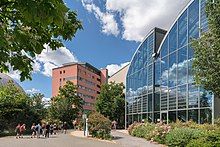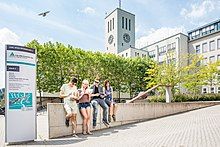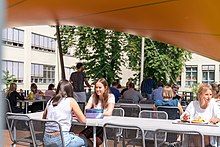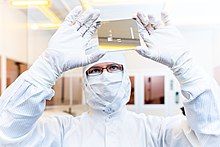Ernst-Abbe-Hochschule Jena
| Type | Fachhochschule |
|---|---|
| Established | 1 October 1991 |
| President | Prof. Dr. Steffen Teichert |
Administrative staff | approx. 450 |
| Students | approx. 4,300 [1] |
| Location | , , 50°55′08″N 11°34′09″E / 50.9189°N 11.5692°E |
| Website | https://www.eah-jena.de |
 | |






University of Applied Sciences Jena[2] (German: Ernst-Abbe-Hochschule Jena (short version: EAH Jena)) was founded on 1 October 1991 as one of the first institutions of higher education of its kind in the newly founded federal states of Germany. Since the beginning of summer semester 2012, it bears the name of the entrepreneur Ernst Abbe. The university is characterized above all by its high practical orientation and research strength. Their slogan is: ENABLING, MOVING, CREATING – TOGETHER.
History
[edit]During the trial operation in the winter semester 1991, 272 students joined, and nowadays about 4,300 students are enrolled at the University of Applied Sciences Jena. After extensive renovation and redesign, at the end of 2001, all departments, the university administration as well as the central library with the patent and research site moved to the campus in the Carl-Zeiss-Promenade in Jena.
In the summer semester 2012, the Fachhochschule Jena was renamed to Ernst-Abbe-Fachhochschule Jena. Due to changes in the Higher Education Act in October 2014, an additional change of name followed. The new name Ernst-Abbe-Hochschule Jena intended to clarify the competences of the university in the areas of teaching and research. The use of the name Ernst Abbe, a researcher, entrepreneur and social reformer, represents the University of Applied Sciences Jena fields of specialisation in a perfect way.
Structure and Courses
[edit]The University of Applied Sciences Jena offers about 50 Bachelor's and Master's degree programs in the fields of technology, business, social affairs and health.[3] They are all characterized by a very high practical relevance. The university ensures this in particular through its integration into various networks, the appointment of professors from industry as well as through project and research work, internships, excursions and theses with numerous cooperation partners. In addition, simulation games, case studies and practical lectures are integrated into the curriculum, interdisciplinary events are offered and coaching-based support services,such as those of the Career Service and the Start-up Service, are made available. The Bachelor's and Master's degree programs at University of Applied Sciences Jena meet high scientific standards and at the same time meet the practical requirements for specialists and managers of tomorrow.
The degree programmes are assigned to the following nine departments:
- Business Administration
- Electrical Engineering and Information Technology
- Fundamental Sciences
- Mechanical Engineering
- Medical Engineering and Biotechnology
- Health and Nursing
- SciTec (Science and Technology)
- Social Work
- Industrial Engineering
Research, development and transfer
[edit]The research and development of University of Applied Sciences Jena includes four research priorities:[4]
- Precision Systems
- Technologies and Materials
- Health and Sustainability
- Digitalisation
The interaction of a wide variety of disciplines enables a creative and innovative approach to research topics and problems. The university understands cooperation with business and society as a multidirectional interaction. That is why we support researchers and teachers as well as external partners in transfer activities. In addition, we promote the transfer of knowledge through internships, theses and doctoral projects as well as through active support and accompaniment in business start-up projects.
International
[edit]The University of Applied Sciences Jena cooperates with numerous universities and research institutions worldwide.[5] It thus promotes the exchange of students, scientists as well as ideas and know-how. The proportion of exchange students is rising continuously. Lecturers at University of Applied Sciences Jena also work temporarily at universities in Europe, Asia, Africa and America. This development is specifically promoted by numerous cooperation agreements. One focus of internationalisation is cooperation within the framework of the ERASMUS+ programme of the European Union. The proportion of international students is around 22%. Studying and internship abroad are integrated into the curriculum in some degree programs.
Graduation and Doctoral degrees
[edit]Interested students have the opportunity of a cooperative doctoral project at the University of Applied Sciences Jena. For this purpose, there are contractual agreements with various universities.[6]
Campus
[edit]The campus of University of Applied Sciences Jena is located in the premises of Carl Zeiss AG. Located southwest of the city center of Jena, the university can be reached quickly. After refurbishment of the last building in October 2008 the campus with a size of 26,000 m2 has seven lecture halls, 124 laboratories and a total of 1,500 rooms. On the grounds of UAS Jena, the Studierendenwerk Thüringen operates two canteens and a dormitory. The library of the University of Applied Sciences Jena includes approximately 300,000 books, videos and CDs.[7] Since June 1999, the University of Applied Sciences Jena has its own climatological station.[8] The local climate is recorded and can be accessed on the Internet.
References
[edit]- ^ UAS Jena (2022): number of students eah-jena.de, April 2024
- ^ University of Applied Sciences Jena eah-jena.de, May 2022
- ^ study programms. eah-jena.de, May 2022
- ^ research focus eah-jena.de, May 2022
- ^ International. eah-jena.de, May 2022
- ^ Graduate support. eah-jena.de, May 2022
- ^ library eah-jena.de, May 2022
- ^ climatological station eah-jena.de, May 2022
